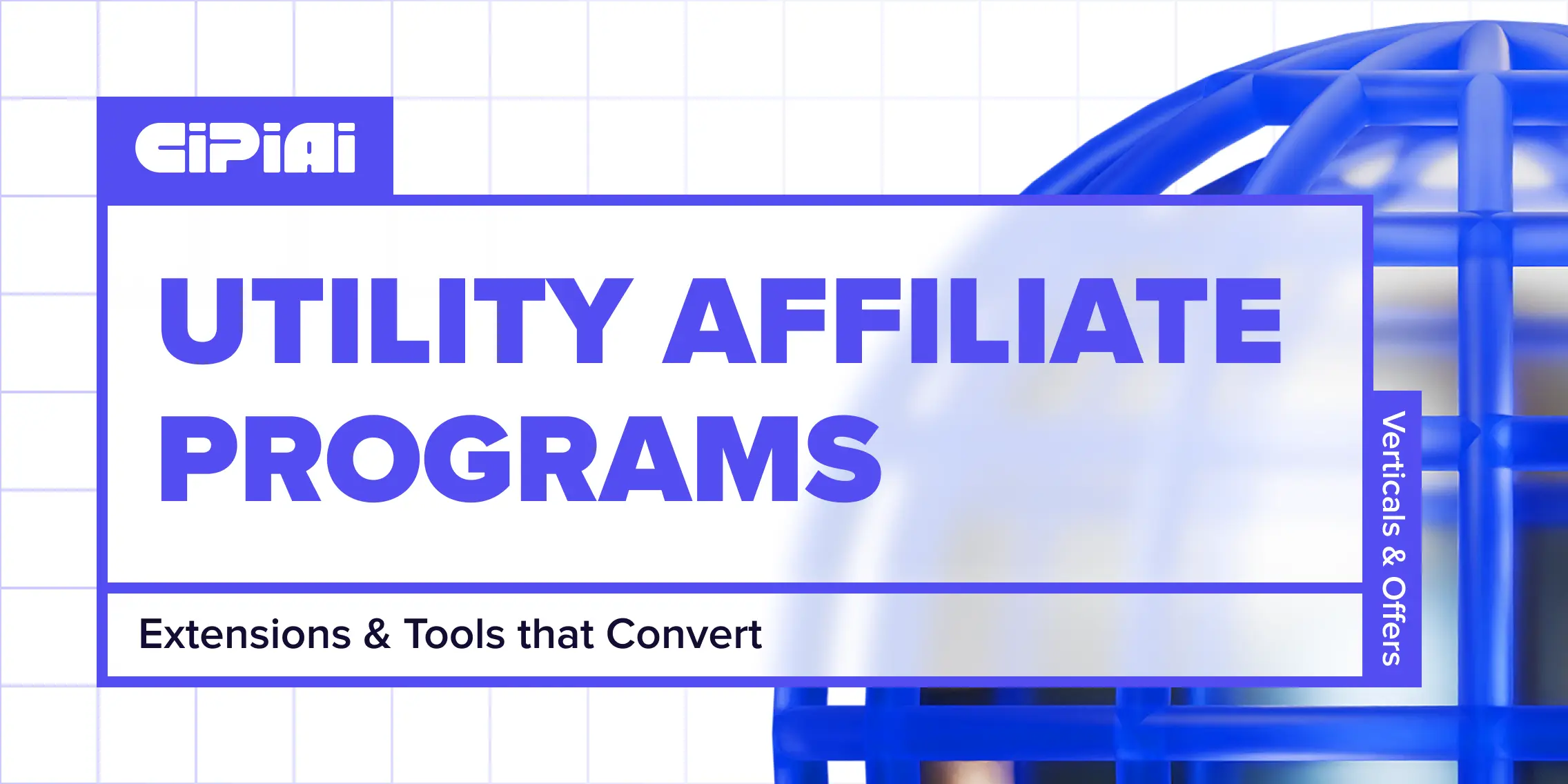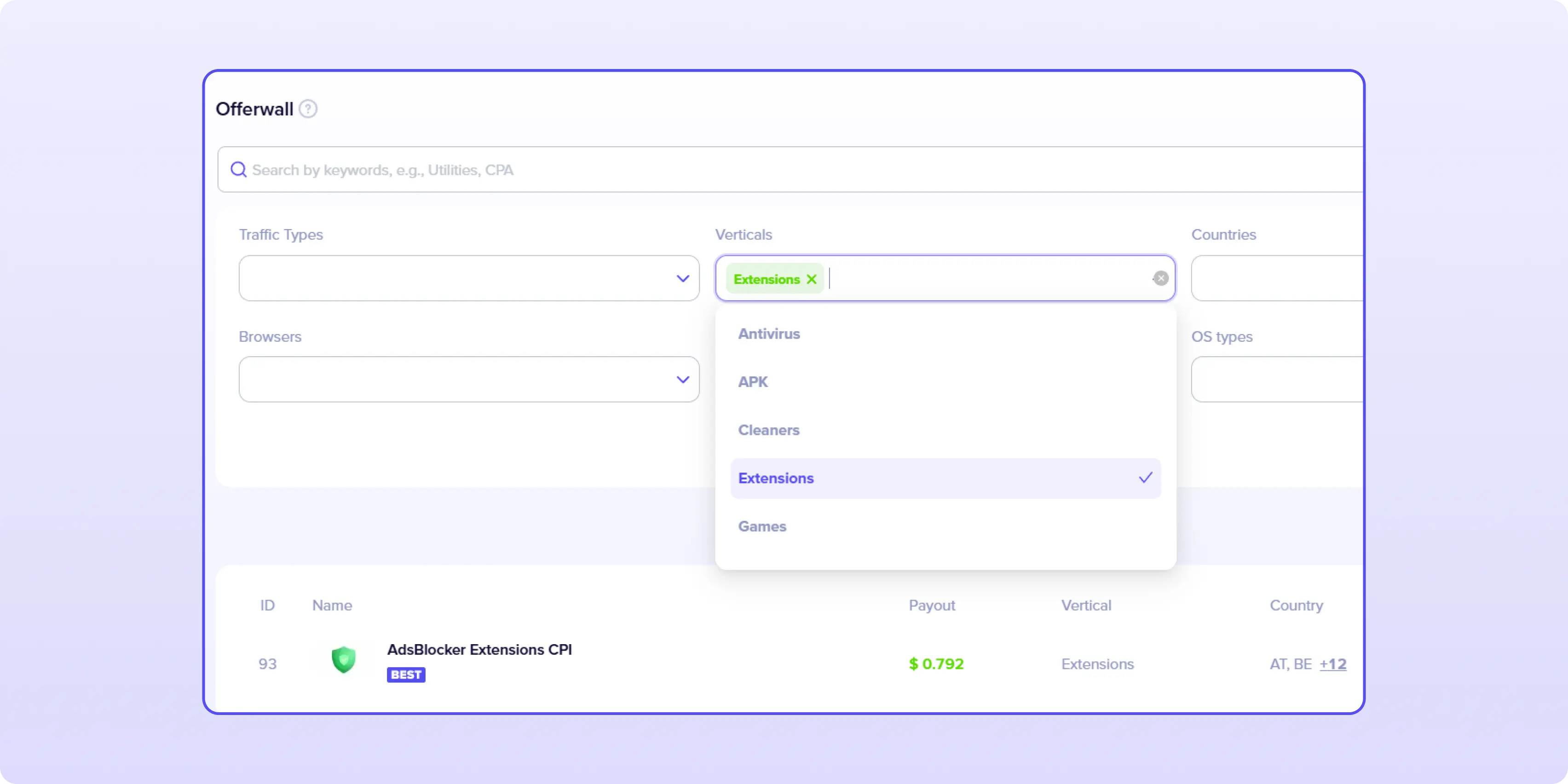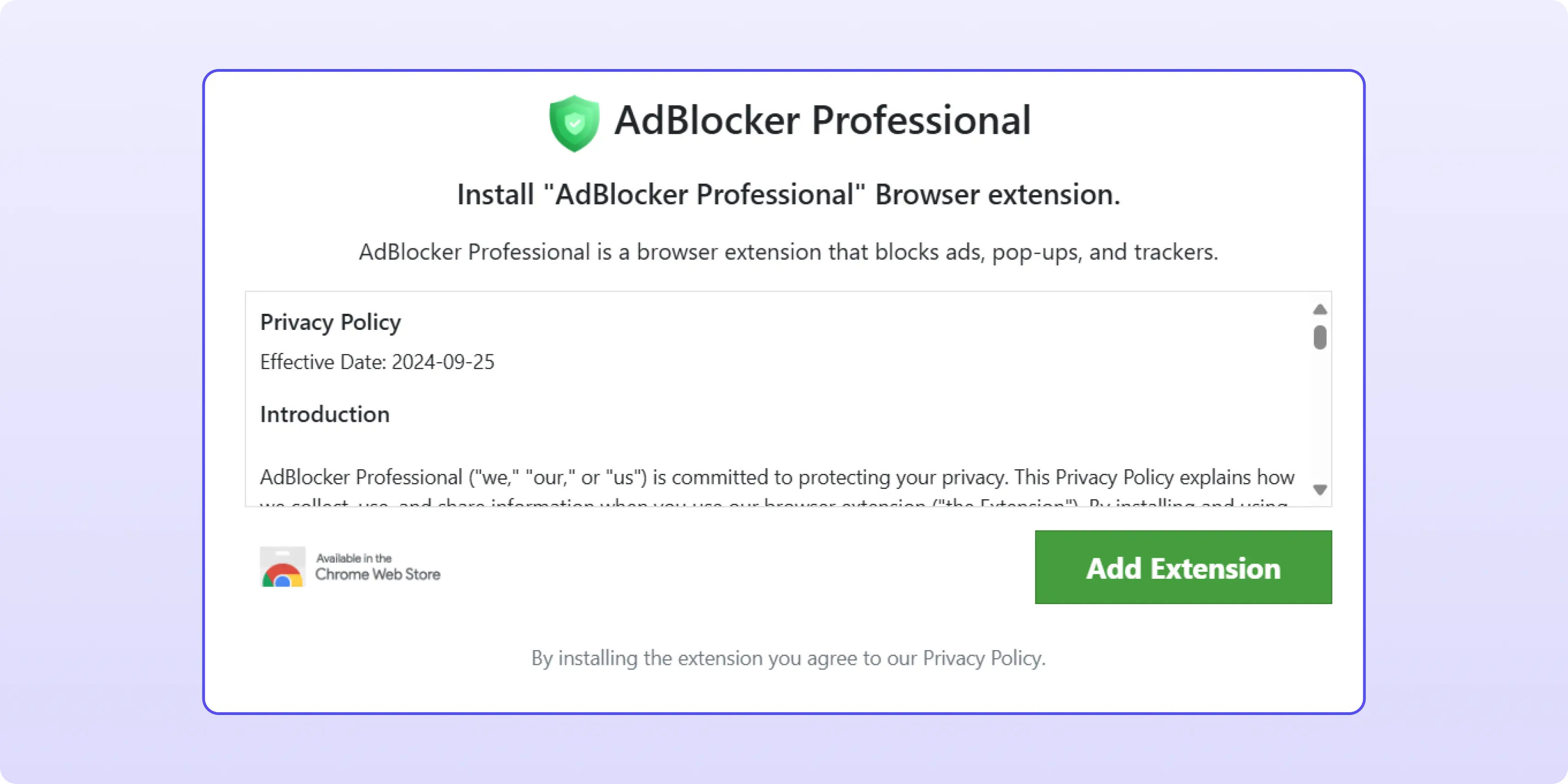
Top Utility Affiliate Programs to Promote in 2026 (Extensions & Tools that Convert)
Discover high-converting utility affiliate programs in 2026. Promote browser extensions, AI tools & ad blockers with CPI offers via CIPIAI — no hold, weekly payouts.

Last updated: January 2026
Browser extensions are small software add-ons that expand the functionality of web browsers. Installed directly from marketplaces such as the Chrome Web Store, Firefox Add-ons, Edge Add-ons, or Opera Store, these tools allow users to customize their online experience — from blocking intrusive ads to managing passwords or boosting productivity.
In simple terms, extensions act as lightweight applications that run inside the browser environment. Popular examples include ad blockers, VPN plugins, grammar checkers, AI writing assistants, and shopping tools that automatically apply coupons. They’ve become integral to how millions of users interact with the internet every day.
The growing popularity of extensions is driven by three main factors — privacy, productivity, and entertainment. As users spend more time in browsers, they expect greater control over their data, smoother workflows, and more convenient access to online utilities. That’s why extensions have evolved from niche tools into a mainstream part of digital life.
For affiliates, understanding what browser extensions are and how they fit into user behavior is key to identifying high-intent audiences and choosing the right browser extension affiliate programs to promote.
The browser extension ecosystem is not just alive — it’s thriving. Below are key data points that reflect both the scale of adoption and the monetization potential of this vertical.
Google Chrome remains the dominant platform, with over 3.45 billion users globally in 2026 and a market share hovering around 64.86 %.
Given Chrome’s dominance, the Chrome Web Store becomes an especially fertile ground for extension installs. As of early 2026, there are 111,933 extensions listed on the Chrome Web Store.
However, usage is heavily skewed: about 85 % of extensions have fewer than 1,000 installations. Only a small fraction ~0.2 % exceed one million installs.
Because Chrome controls two-thirds of the browser market, extensions built for or compatible with Chrome immediately gain access to a massive user base.
Among the most popular extension categories are:
One particularly fast-growing niche is AI Chrome extensions. Analysts forecast that the AI-powered extension market could reach USD 28.1 billion by 2032, growing at a CAGR of ~17.38 %.
Other reports estimate the AI Chrome extension sector (as part of broader extension verticals) could grow from USD 2.54 billion in 2024 to USD 8.24 billion by 2033 (CAGR ~14.5 %).
Extensions are not just for free utility — they can generate real revenue. For instance:
These examples demonstrate the monetization potential behind the extension vertical—especially once an extension passes critical adoption thresholds and establishes trust.
Browser extensions appeal to a broad, yet distinct cross-section of users — those who prioritize privacy, speed, and personalization in their online experience.
Extensions historically have been desktop-first, as desktop browsers (Chrome, Firefox, Edge) allow richer extension APIs. With mobile browsers (e.g. mobile Chrome, Firefox for Android), the extension support is more limited or selective, so affiliates may see stronger performance when targeting desktop users. However, as mobile browsers evolve, demand for lightweight mobile-compatible extensions is growing.
In short, who uses browser extensions? — it’s a mix of privacy-focused individuals, productivity-oriented professionals, students, and marketers. If your campaigns are aligned with those audiences, extension offers have strong conversion potential.
Browser extension affiliate offers occupy a special space where utility meets engagement. Unlike many one-time purchases, good extensions tend to remain installed for months or even years, giving affiliates access to high retention traffic and the possibility for recurring commissions.
Because extensions deliver ongoing value (e.g. VPN, ad blocking, productivity), users are more likely to stick with a paid or premium version — which is why extension monetization strategies like subscriptions or freemium upsells often work well. This retention-driven model is one of the hallmarks of browser extension affiliate marketing.
Another powerful advantage is cross-promotion potential. Extensions pair naturally with related verticals such as VPN services, antivirus software, system cleaner tools, or privacy utilities. Affiliates can bundle offers or refer users to complementary add-ons, increasing overall lifetime value per user.
However, there is a layer of complexity with browser-store compliance and user trust. Browser marketplaces (Chrome Web Store, Firefox Add-ons) impose strict rules on permissions, data usage, and creative messaging. Affiliate marketers promoting extensions must adhere to these policies and avoid deceptive claims. Misuse of permissions or opaque monetization practices can erode trust and even lead to removal of the extension from the store.
In short, what makes extension affiliate programs unique is their blend of long-term engagement, recurring revenue, natural cross-vertical synergy, and the need for careful compliance — making the best extension affiliate programs those that balance value, retention, and transparency.
Affiliates who want to enter the browser-extension space should focus on curated affiliate networks that specialize in software and utility verticals. One of the most reliable options is the CIPIAI affiliate program, which provides access to verified advertisers and safe monetization models across extensions, VPNs, utilities, and AI tools.

Within CIPIAI’s ecosystem, affiliates can find several strong browser extension offers — from privacy-focused ad blockers to AI productivity utilities. For instance, a popular campaign in the network is the AdsBlocker Extension CPI offer, built for affiliates targeting desktop traffic.

This offer promotes a Chrome-based ad blocker designed to improve page-loading speed and user privacy. It operates on a CPI (Cost Per Install) conversion flow, where affiliates earn a payout for every valid installation. The offer accepts traffic from desktop devices on any OS but requires the use of Chrome as the target browser.
Top-performing GEOs include Belgium (BE), France (FR), and the Netherlands (NL) — markets with high browser-extension penetration and privacy-aware audiences. Conversions are verified manually by the advertiser with a 30-day confirmation window, ensuring quality control and fraud prevention. Prohibited traffic sources include bot, incentivized, or fraudulent installs, which maintains compliance with Chrome Web Store policies.
Because there’s an active cap on available installs, affiliates are encouraged to coordinate with their CIPIAI manager to secure traffic slots in advance.
By joining an established extension affiliate network like CIPIAI, partners get access not only to reliable browser extension offers but also to related products — VPNs, AI tools, and cleaner utilities — that can be cross-promoted to the same user base for higher ROI.
Running browser extension affiliate campaigns successfully requires a balance between traffic quality, user trust, and strategic positioning. Here are proven methods that help affiliates scale their results while staying compliant.
1. Leverage SEO and Organic Discovery
Search intent around extensions remains strong — queries like “best Chrome extensions”, “free ad blocker”, or “AI productivity extensions” attract users ready to install. Affiliates who invest in content marketing — blog posts, how-to articles, and comparison guides — can capture consistent organic traffic. Ranking for these terms not only builds authority but also drives installs with long-term ROI.
2. Use Paid Channels Strategically
Search campaigns on Google or Microsoft Ads are great for targeting users who already know what they want. For discovery traffic, native ads and Reddit Ads can perform well, especially when focused on privacy, speed, or AI productivity topics. Reddit, in particular, allows affiliates to reach communities discussing Chrome extensions, utilities, or browser tweaks in a natural context.
3. Invest in Content & Video Marketing
Educational content converts. Tutorials, YouTube demos, and TikTok reviews showing installation steps and real benefits help users trust your recommendation. Affiliates who highlight transparency and simplicity (“how the extension works,” “what it blocks,” “how much it saves”) tend to achieve higher engagement rates.
4. Stay Transparent and Compliant
With browser-store policies tightening, affiliates must avoid misleading creatives or forced installs. Focus on highlighting user value — faster browsing, better privacy, or improved productivity — rather than clickbait. Clear CTAs and verified download sources help maintain user trust and avoid account suspensions.
In short, successful affiliates know how to promote browser extensions by combining SEO-driven content, performance ads, and authentic communication. Master these extension marketing tips, and you’ll be able to scale high-quality campaigns in one of the most stable software verticals.
Browser extensions have evolved from small add-ons into a powerful ecosystem — and for affiliates, they represent one of the most stable and scalable tech verticals today. With millions of daily active users and consistent install behavior, extensions combine high user engagement with the potential for recurring monetization through subscriptions, premium upgrades, or bundled offers.
For affiliates who want to grow within the tech and utility space, CIPIAI provides vetted extension offers — from ad blockers and AI tools to privacy utilities — all backed by transparent tracking and reliable payouts. By joining the CIPIAI affiliate network, you gain access to trusted advertisers, compliant offers, and expert support to scale campaigns across top GEOs.
In short, the browser extension vertical rewards affiliates who think long-term: focus on value, build trust, and leverage offers that deliver genuine utility to users — and the results will compound over time.

A browser extension affiliate program allows marketers to earn commissions by promoting software add-ons for web browsers. Affiliates drive installs or subscriptions for extensions such as ad blockers, VPNs, or AI productivity tools, earning revenue for each qualified action — typically per install (CPI) or per upgrade (CPA/RevShare).
Yes — browser extension offers are highly profitable when promoted correctly. Because many extensions operate on freemium or subscription models, affiliates can generate recurring income from repeat users. The vertical combines high user engagement with global scalability, making it one of the most sustainable niches in performance marketing.
Tier-1 markets such as the US, UK, Germany, France, and the Netherlands perform best due to strong adoption of Chrome and other desktop browsers. However, emerging markets in Eastern Europe, LATAM, and Southeast Asia are growing quickly and can offer lower competition with solid install rates.
Most extension affiliate programs operate on CPA (Cost Per Acquisition) or CPI (Cost Per Install) models. Some advertisers also offer RevShare, especially when extensions have premium plans or in-app purchases. This allows affiliates to earn a share of recurring revenue as long as the user remains active.
Compliance is key in this niche. Affiliates must avoid misleading creatives, forced installs, or fake download pages. Promotions should clearly state what the extension does and link only to approved browser-store pages. Working with networks like CIPIAI, which provides pre-vetted advertisers and transparent policies, helps ensure campaigns remain compliant and profitable.
Copyright © 2026. Bisdev Solutions Limited
All rights reserved